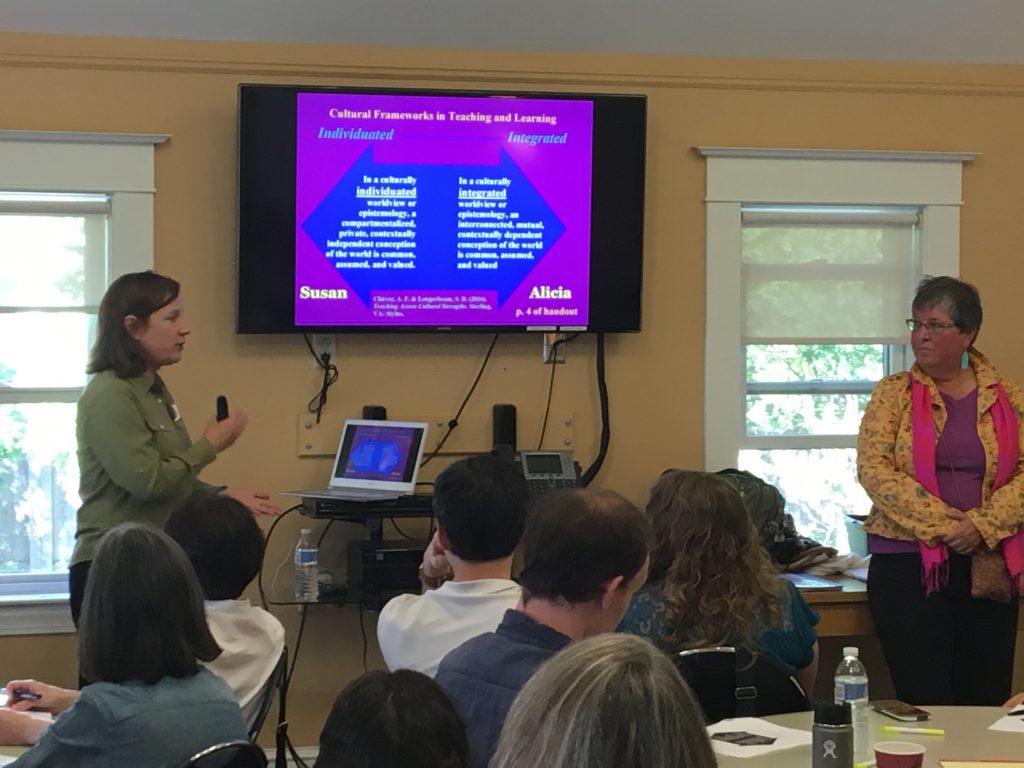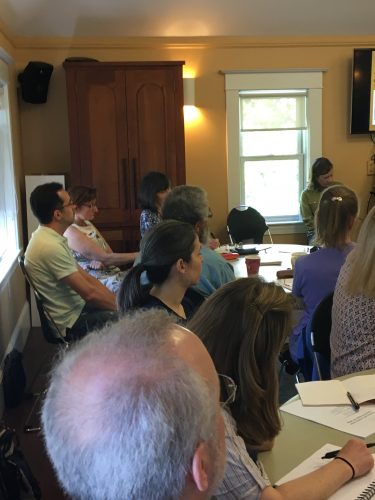New Initiative Aims to Strengthen Cross-Cultural Teaching
By Tom Porter
Being aware of your own cultural background as well as that of your students is critical to more effective teaching and learning—that was the message explored recently by fifty Bowdoin professors taking part in the first day of the College’s four-day May Institute.
Organized by the Center for Learning and Teaching, the inaugural May Institute aims to develop teaching methods that optimize student outcomes by creating inclusive and equitable learning environments. In her opening comments, Dean for Academic Affairs Elizabeth McCormack stressed the importance of “balancing integrated and individual cultural frameworks to support the success of all students.”
Alicia F. Chavez and Susan D. Longerbeam, who wrote the book, Teaching Across Cultural Strengths (2016), were brought in to share their expertise and run the opening workshop. “We’re here to help faculty teach more effectively across cultures, also to draw from the strengths of their own cultures as well as that of their students,” said Chavez, an associate professor of educational leadership at the University of New Mexico.

One of the most common mistakes made by educators, she explained, is a lack of self-awareness.
“Most people in the US don’t see themselves
“It comes down through the values
“The tendency with us educators,” she said, “can be to interpret students based on our own cultural learning, teaching the way that we were taught.”
This, she continued, can be unfair for students whose cultural backgrounds differ from those of the teacher or the majority of their classmates. “Cultural awareness can
Chavez said it’s a challenge she had to confront when she went to college, after growing up in an Hispanic-Apache family and moving to a predominantly white learning environment where she was in the minority.
Chavez and Longerbeam, an associate professor of education and counseling psychology at the University of Louisville, urged the attending faculty members to balance their pedagogy across integrated and individuated ways in order to support meaningful learning for all students.
“You may have a student with
For many students of racially or culturally
“It’s not about making it easier for these students, but about helping them learn because people learn differently,” It’s also important, she stressed, to understand that treating students fairly is not the same as treating them equitably. “Things start unfair, so being fair means treating each student as an individual according to where they come from and how they perform. It does not mean treating students the same.”
Throughout the week, twelve CLT Faculty Fellows continued to engage in other workshops and dialogues aimed at building on these ideas and designing course improvement plans for fall 2018 courses. In addition to the May Institute, fellows participate in a semester-long Teaching Triangle, monthly meetings, CLT-sponsored events, and a host of other activities and assignments.
The CLT Faculty Fellows program is a year-long commitment of a group of select faculty to participate in reflective practice on challenges and opportunities to enhance the learning environment for all students at Bowdoin.
“Bowdoin has a responsibility to provide the best educational opportunities to every student it admits, and it was great to be in a room with so many colleagues dedicated to that mission,” said history professor and CLT Faculty Fellow Patrick Rael.
“The Dean and the CLT are taking positive steps to enhance an inclusive teaching culture on campus; this critical piece will help faculty members think about what diversity might mean for their classrooms.”
Andrew W. Mellon Postdoctoral Fellow in Religion Anya Golovkova described the faculty fellows program as a fantastic opportunity to continue developing as a teacher and scholar.
“For my project as part of this program,” she said, “I am working on integrating inclusive strategies into the role-playing methodology called Reacting to the Past, which I will use in my REL 1101 (Introduction to Religion) course next fall.”